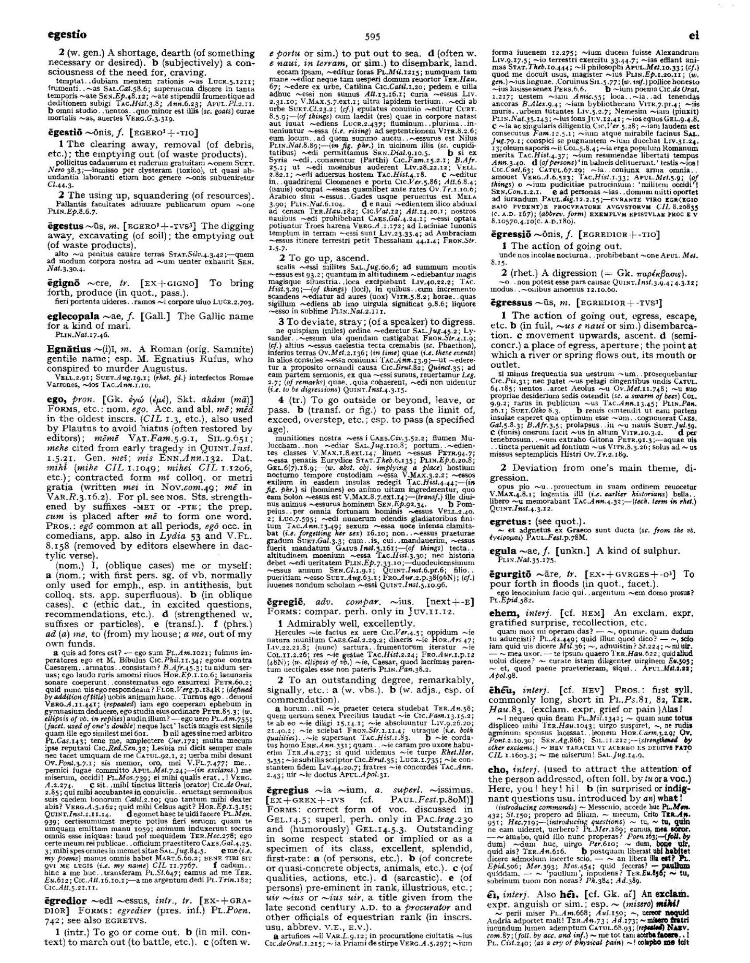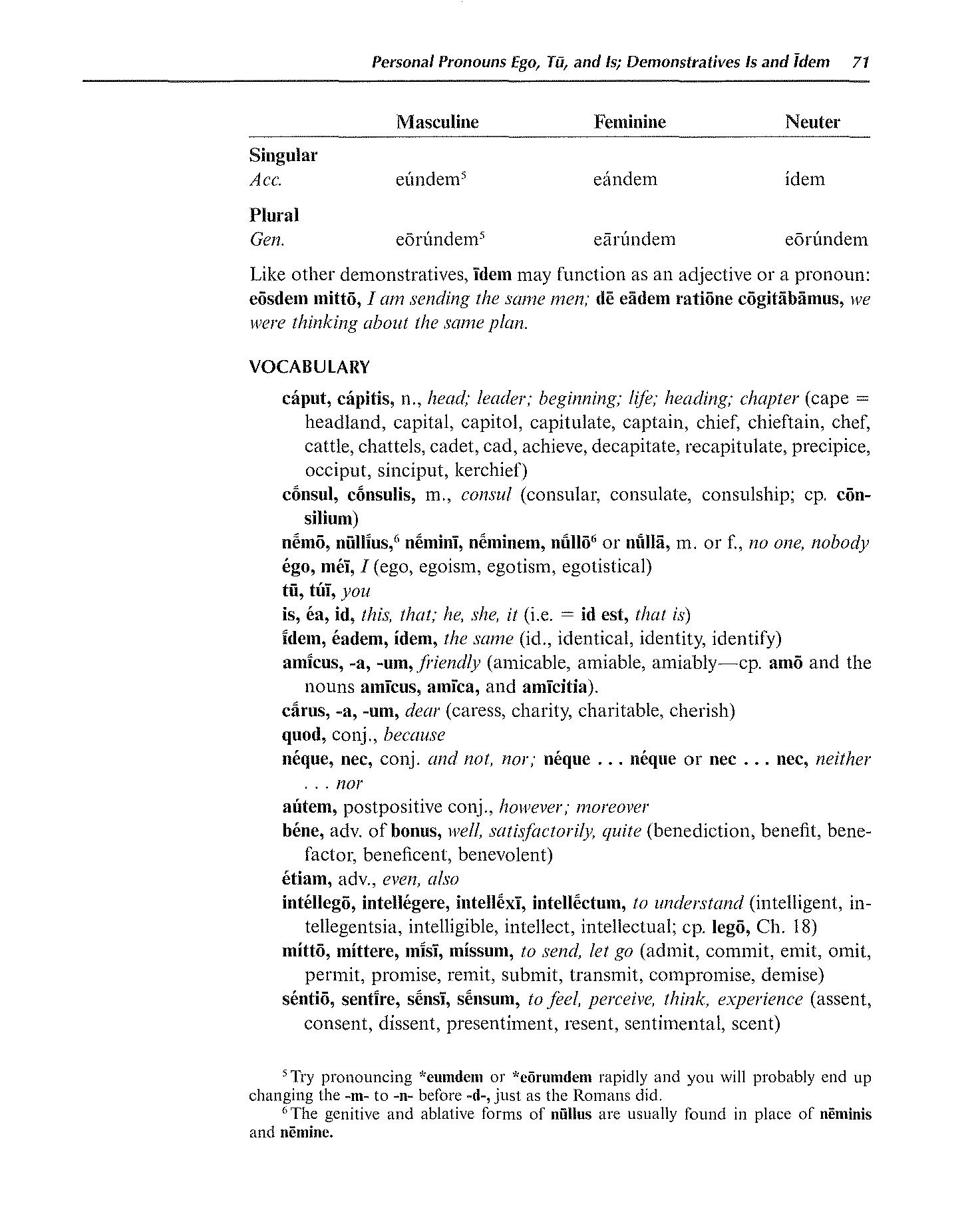
page_listing.tpl
page_subListingDetails.tpl
sub_listingDetails_style1.tpl
sub_listingDetails.title.tpl
ego, meī I
ego, meī is a Latin Pronoun that primarily means I.
Definitions for ego, meī
Wheelock's Latin
Pronoun
- 1
I
English derivatives:
ego egoism egotism egotistical
Oxford Latin Dictionary
Pronoun
- 1
(nom.) I, (oblique cases) me or myself: (a) (nom.; with first pers. sg. of vb/ normally only used form emph., esp. in antithesis, but colloq. sts. app. superfluous(. (b) (in oblique cases). (c) (ethic dat., in excited questions, recommendations, etc.). (d) (strengthened w. suffixes or particles). (e) (transf.). (f) (phrs.) ad (a) me, to (from) my house; a me, out of my own funds.
Sentences with ego, meī
Latin to English
Ego eīs pecūniam dabō; quid tū dabis?Compare I shall give them money; what will you give?
Ast ego quae divum incēdō rēgīna Iouisque et soror et conjunx ūnā cum gente tot annōs bella gerō.Compare Yet I, who walk about as queen of the gods, wife and sister of Jove, wage war on a whole race, for so many years.
Amīcum fīliī meī vidēs.Compare You (sg.) see the friend of my son.
Ego dīvitiās sapientiae antepōnō. Nōn enim arbitror hominēs vītam fēlīcem sine cōpiā pecūniae reperīre posse.Compare For my part I place wealth ahead of wisdom. For I do not think that human beings can find a happy life without a great deal of money.
Ego omnia els explicabo.Compare I will explain everything to them.
Credo ego Amorem primum apud homines carnificinam commentum. [Cistelaria, 203]Compare I do believe it was Love that first devised the torturer's profession here on earth.
Ego deum genus esse semper dixi et dicam caelitum, sed eos non curare opinor quid agat humanum genus; nam si curent, bene bonis sit, male malis; quod nunc abest.Compare I have always said and I will go on saying, there is a race of gods in heaven, but I do not believe that they concern themselves with what the human race is doing; for if they did, good men would fare well, and bad men ill, which is not the case now.
Data sources
Notes
- Definitions
- Frederick M. Wheelock, Wheelock's Latin, 6th ed., rev. Richard A. LaFleur (New York, NY: HarperCollins Publishers, 2005): 71.
- P. G. W. Glare, Oxford Latin Dictionary, Vols. 1-8 (Oxford: Clarendon Press, 1982): 595.
- Word frequencies
- Christopher Francese, "Latin Core Vocabulary," Dickinson College Commentaries, last modified 2014, http://dcc.dickinson.edu.
- Paul B. Diederich, The Frequency of Latin Words and Their Endings, PhD diss., (Columbia University, 1939).
- Louis Delatte, Suzanne Govaerts, Joseph Denooz, and Etienne Evrard, Dictionnaire fréquentiel et index inverse de la langue latine [Frequency Dictionary and Inverse Index of the Latin Language] (Liège, Belgium: Laboratoire d'analyse statistique des langues anciennes de l'Université de Liège [L.A.S.L.A.], 1981): 119.
Bibliography
Allen, Joseph H. Allen and Greenough's New Latin Grammar for Schools and Colleges: Founded on Comparative Grammar. Edited by James B. Greenough, George L. Kittredge, Albert A. Howard, and Benjamin L. D'Ooge. Boston, MA: Ginn & Company, 1903.
Crystal, David. A Dictionary of Linguistics and Phonetics. 6th ed. Oxford, UK: Blackwell Publishing, 2008.
Delatte, Louis, Suzanne Govaerts, Joseph Denooz, and Etienne Evrard. Dictionnaire fréquentiel et index inverse de la langue latine [Frequency Dictionary and Inverse Index of the Latin Language]. Liège, Belgium: Laboratoire d'analyse statistique des langues anciennes de l'Université de Liège (L.A.S.L.A.), 1981.
Diederich, Paul B. The Frequency of Latin Words and Their Endings. PhD diss., Columbia University, 1939.
Francese, Christopher. "Latin Core Vocabulary." Dickinson College Commentaries. Last modified 2014. http://dcc.dickinson.edu/latin-vocabulary-list.
Gildersleeve, Basil L., and Gonzales Lodge. Gildersleeve's Latin Grammar: Third Edition, Revised, and Enlarged. 3rd ed. London, England: Macmillan and Co., 1903.
Glare, Peter G.W. Oxford Latin Dictionary. Vols. 1-8. Oxford, England: Clarendon Press, 1982.
Krüger, Bernd. "Latin Conjugation Tables." Cactus2000. Accessed May 5, 2023. https://latin.cactus2000.de/index.en.php.
Pierson, Nick. "Sound of Text." Accessed October 26, 2019. https://soundoftext.com.
Wheelock, Frederick M. Wheelock's Latin. 6th ed. Revised by Richard A. LaFleur. New York, NY: HarperCollins Publishers, 2005.
Wiktionary Contributors. "Victionarium." Wikimedia Foundation, Inc. Updated March 18, 2019. https://la.wiktionary.org/wiki/Victionarium:Pagina_prima.
Citation
Chicago (17th ed.)
Allo Contributors. "ego, meī (pron.) - Latin Word Definition." Allo Latin Dictionary. Last modified . Accessed February 19, 2026. http://ancientlanguages.org/latin/dictionary/ego-mei.
Entry created on . Last updated on .







